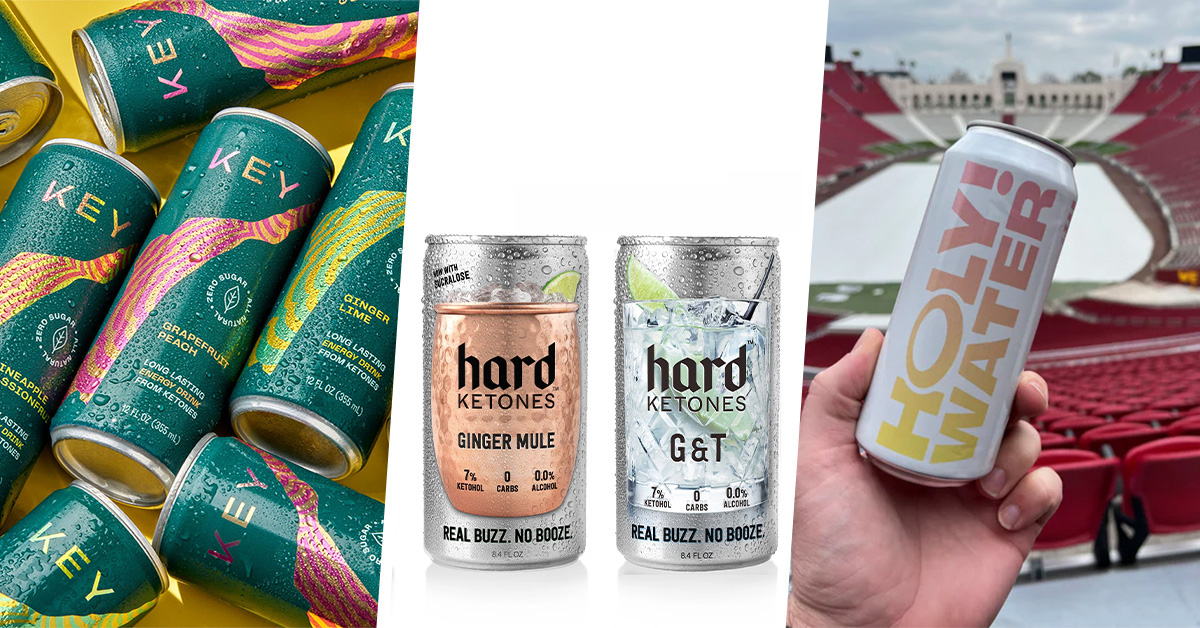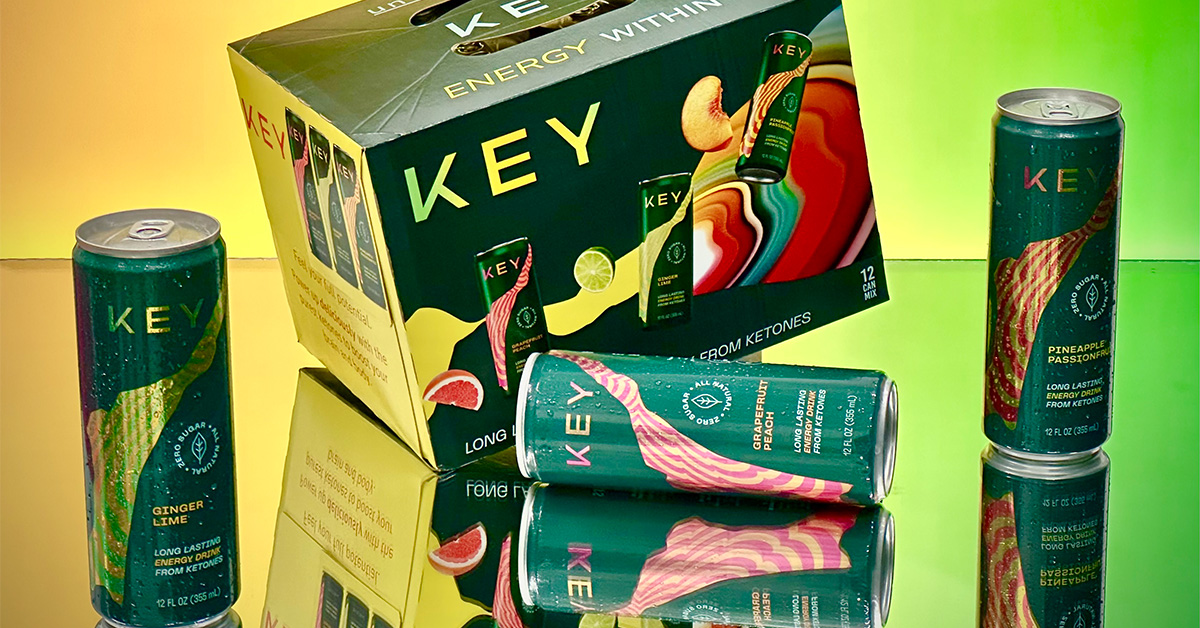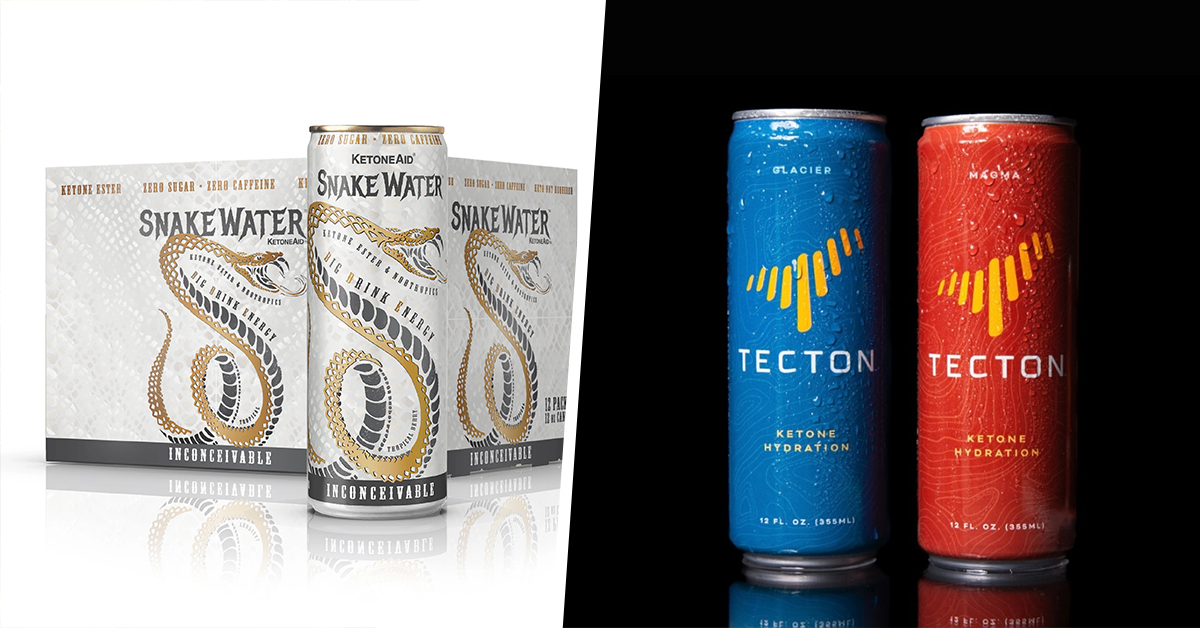Caffeine has been powering the energy drink category for decades, but an increasing number of innovative startup brands are looking towards a new ingredient – ketones – to fuel the category’s next leap forward.
Even as the “keto diet” helped introduce consumers to ketosis and its purported benefits, ketones themselves have lagged behind in terms of awareness, with unpalatable taste, high price point, and education around dosing and use being major obstacles to adoption in mainstream RTD beverages, rather than supplements. Yet inside influential retailers on the East and West Coasts, there are encouraging signs of change.
Last week, ketone-infused energy drink brand KEY entered the category with the backing of a $4 million pre-launch investment that has helped place the brand in Erewhon in Southern California, and independent convenience stores in New York. It’s a sign of validation for the brand – which is joined in the nascent space by fellow startups like KetoneAid and My Crew Doses, among others – but also a sign of the hard work ahead in redefining “keto” within CPG.
“We don’t want to be a ‘Keto’ product,” said KEY co-founder Karishma Thawani. “This is a new source of energy that your body has been naturally making. Ketones have been fighting for you, they have been hiding inside and giving you energy.”
What Are Ketones?
Ketones — Beta hydroxybutyrate — act as an alternative energy source for the body that is not derived from proteins, fats, sugars and carbohydrates. Similar to the ketogenic diet, ketone-based beverages tap this energy source with claims that ketones increase focus, create a euphoric feeling and can aid in endurance. Unlike ketogenic diets, ketone drinks taken on their own without diet changes are not believed to put a person’s body into ketosis.
There remains some debate as to how much ketone drinks can enhance physical performance among athletes.
Despite what research might be saying, ketones have been moving from the supplement shelf to the refrigerated drink case in many retailers as consumers look for the newest functional beverage to add to their biohacking regimes or fitness goals.
For KEY, the angle is to replace the “sugar shock or the caffeine jitters” that are inherent in the energy drink category and go after the lifestyle brand positioning, Thawani said.
“We don’t want to remind people constantly that this is a healthier alternative; our positioning is that this energy drink helps you tap into your full potential,” she added.
Unlocking that energy source while reducing the sugar and caffeine is where the brand is attempting to disrupt not only energy category leaders like Monster or Red Bull but also the “OG energy drinks”: caffeinated soda. Like many brands in the ketone subcategory, Key formulates its drinks with other ingredients to boost the effects. In this case, green tea extract and L-Theanine are added to the formulation to accentuate the intended benefits.
The new drink is available in three flavors (Grapefruit Peach, Pineapple Passionfruit and Ginger Lime) with 12-packs selling online for $45.99.
The brand launched with investment led by AgFunder with additional support from Alethia Venture Partners and AgFunder SIJ Impact Fund. Using co-founder Tekla Back’s experience as a VP of marketing and strategy at PepsiCo for 7 years, the brand is targeting New York and Southern California this year with plans to expand in natural chains and c-stores in 2025.
Key is planning to do activations at music events to drive brand awareness and targeting micro-communities like surfers or gamers to build affinity for the drink, Thawani said. “Beverage brands are built out on the streets.”
Gotham Brands DSD founder Trent Moffat said his distributorship took on KEY in New York City because it was the first ketone drink that not only tasted good but looked like it could live on the energy shelf next to fast-moving brands like Celsius where diet-conscious consumers are shopping.
“The more players that continue to drive this category, the more education people are going to get. You can’t just be the only one out there. Eventually you need competition,” Moffat said. “Nobody knew coconut water 10 years ago and everybody knows it now because there’s so many players in it.”
As ketone beverages move into other parts of the store, there are still a number of brands positioned towards the exercise and fitness-oriented health benefits of drinking ketones.
Taking an approach similar to the fitness energy category, Kenetik markets itself as a “health drink” used to power workouts and fuel busy lifestyles. The brand is available in 12 oz. cans and comes in three flavors: Blackberry Lemonade, Strawberry Peach and Pineapple Passion Fruit.
Biotech company Tecton, founded by a long-time Coca-Cola executive Udaiyan Jatar, has two RTD “hydration” drinks that use ketones that claim to provide muscle recovery, mental focus and an endurance boost without sugar or caffeine.
Owning up to the often bitter and unpleasant flavor profile of ketones (especially ketone ester), HVMN (Health Via Modern Nutrition) makes the Ketone-IQ shot brand that is intended to be taken by athletes for its performance-boosting effects rather than its enjoyable taste. The brand has attempted to move out of the dietary supplements category and into more mainstream appeal.
All three brands price their drinks at around $5 per serving and have rosters of fitness influencers, athletes and doctors serving as brand ambassadors to the purporting the health benefits of the respective ketone drinks.
Moving Beyond Energy
Another newcomer to the ketone drink space is Holy Water, launched in mid-February. The single-variety, “enhanced ketone hydration” beverage, produced by parent company My Crew Doses, comes in 16 oz. cans and, similar to KEY, is targeting placement as an alcohol alternative at venues like the L.A. Coliseum and at upcoming LiveNation events.
Along with being a direct vendor on-premise, Holy Water is working with beer DSDs like Jack Hilliard Distributing in Texas while tapping L.A. Libations and Presence Marketing to work as the brand’s brokers.
Brokers serve a “critical role” in placements throughout the store, co-founder BJ McCaslin said, particularly for an “evolving” ketone category that may not have a ready-made home within grocery shelves.
“I’ve never used brokers in my life even after two decades in the beverage business,” McCaslin said, referencing his time at Vita Coco and founding canned wine brand Coastal Spritz (now Sayless Spritz). “Now, I make sure I have a broker to cover every single base so we’re programmed correctly once we hit the distributor in their back receiving area.”
The message that Holy Water is telling to its prospective customers is that the product is formulated to give a euphoric feeling with the added benefits of good sleep, mental clarity and increased energy.
The brand is doing this by formulating the product, along with its ketone load, with a host of nootropics and adaptogenic ingredients including schisandra berry extract, functional mushrooms (lion’s mane, cordyceps and chaga), yerba mate tea powder, l-theanine and milk thistle.
One ketone drink maker, KetoneAid, goes even further in its pitch as an alcohol replacement: The company’s Hard Ketones RTDs use R 1,3-butanediol as its active ingredient to provide the “buzzy” feeling. The line comes in three flavors (Piña Colada, Ginger Mule and G&T) as well as an unsweetened Dr. Up product meant to be used as a mixer. The brand is also developing a ketone beer and wine spritz as well.
KetoneAid also makes a functional sparkling KetoneWater, Ketone Shots and a cheekily named energy drink called SnakeWater that pokes fun at energy brands’ performance-enhancing claims.
The difficult part for KetoneAid founder Frank LLosa is educating a consumer base that not all ketone drinks are the same and “different ketones lead to different results,” he said. KetoneAid and the shots are harder on the palate and rely on “the original Ketone Ester” (D-Beta Hydroxybutyrate bound to R 1,3 butanediol) as the functional ingredient which provides more benefits than other ketones, claims LLosa.
“The Hard Ketones are all about taste because most of the consumers don’t even know what ketones are. So the audience for that is well beyond the keto world,” he said. “The larger audience is just the alcohol reduction community, helping people get off regular alcohol and just people that want to be healthier.”
It’s a strategy that can be hard to sell in stores and, even more than other ketone brands’ positionings, has few comparisons in brick-and-mortar retail. KetoneAid has thus focused its sales nearly exclusively on direct-to-consumer and ecommerce platforms like Amazon relying on social platforms and its influencer network to drive sales. Online offers a place where brands can educate consumers more efficiently on what the product is and how they should use it.
“It’s unclear whether the retail world can understand this with a shelf presence [or] explainer on the box,” he said. “It’s unclear whether that’s enough to explain to the customer why this drink is so drastically different from everything else.”


